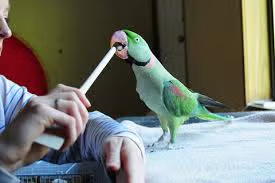Addressing Common Behavior Problems in Pet Birds

Author: Vejay Anand
Pet birds, like any other animals, may exhibit behavior problems that can challenge their owners. Understanding the underlying causes and addressing these issues is vital for maintaining a harmonious relationship with your feathered friend. Here are five of the most common behavior problems in pet birds, insights into their possible meanings, and practical solutions.
Biting Behavior:
Biting is a frequently reported concern among bird owners. While it can be painful, identifying the root cause is essential for addressing this behavior. Ask yourself whether your bird might be frightened, experiencing hormonal changes, or attempting to engage in play. Once you've determined the cause, you can implement strategies to discourage biting. For instance, gradually desensitizing birds to human interaction can help reduce fear-based biting.
Excessive Screaming:
Excessive screaming can be a source of frustration for bird owners. While some vocalization is normal for birds, persistent screaming may signify boredom, loneliness, or stress. Ensure your bird's well-being by ruling out medical issues through consultation with an avian veterinarian. If the screaming persists, consider seeking guidance from a parrot behavior consultant to effectively modify your bird's behavior.
Destructive Behavior:
Destructive behavior in parrots often indicates environmental issues or a lack of mental stimulation. These brilliant birds need cognitive engagement to prevent boredom. To address violent tendencies, evaluate how you spend time with your pet and incorporate them into your daily activities. Including your bird in your daily routines can significantly reduce destructive behavior.
Territoriality:
Territorial behavior can result from hormonal changes but can also signal discomfort in your bird's relationship with you. To address territoriality, focus on bonding techniques to strengthen your connection with your bird. Fundamental improvements in your relationship can help resolve these issues. If the problems persist, consider consulting a parrot behavior consultant for expert assistance.
Feather Plucking:
Feather plucking is often a sign of severe depression or unease in a bird's environment. It's crucial to consult an avian veterinarian to rule out diseases like psittacine beak and feather disease (PBFD). If medical causes are ruled out, evaluate your bird's living conditions, diet, and social interaction. Ensure your bird lives in an adequately sized, clean cage, receives a balanced diet, and benefits from quality human interaction to prevent feather plucking.
Addressing these common behavior problems in pet birds can foster a happy and healthy relationship with your feathered companion.

